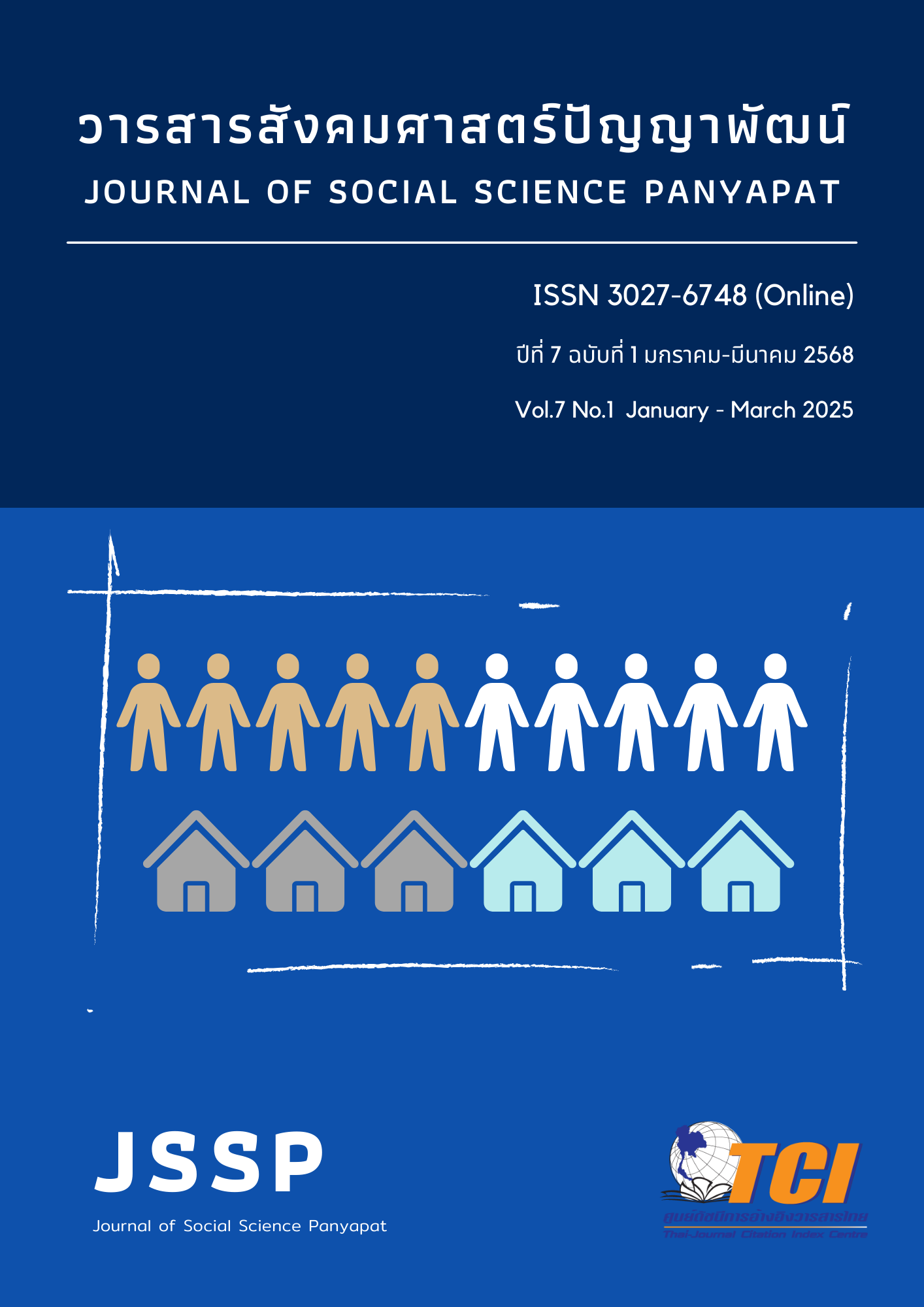แนวทางการสอนศาสนาเพื่อเสริมสร้างความเป็นพลเมืองโลก: บทเรียนสำคัญของครูสังคมศึกษา
คำสำคัญ:
การสอนศาสนา, ภาวะพลเมืองโลก, สังคมศึกษา, การจัดการเรียนรู้บทคัดย่อ
บทความนี้มุ่งเน้นอธิบายภาวะพลเมืองโลกซึ่งเป็นส่วนสำคัญในการตระหนักและเข้าใจกันเป็นอย่างดีในการอยู่ร่วมกันอย่างสันติสุข ภาวะความเป็นพลเมืองโลกจึงเป็นกุญแจชิ้นสำคัญในการปลดสลักความขัดแย้งที่ดำรงอยู่ในมุมมองต่าง ๆ ที่ยาวนาน ทั้งนี้ก็เนื่องมาจากภาวะพลเมืองโลกเป็นการมุ่งเน้นให้แต่ละคนตระหนักถึงการเป็นส่วนหนึ่งในฐานะมนุษย์ร่วมกันในโลกนี้ ภาวะพลเมืองโลกจึงมีพลังในตัวมันเอง และก่อให้เกิดความต่อเนื่องของการแก้ปัญหาต่าง ๆ ได้ ในระดับการพัฒนา ภาวะพลเมืองโลกถูกหยิบยื่นเข้ามาให้ระบบการศึกษาสานต่อและปลูกฝังภาวะพลเมืองโลกให้กับปัจเจกบุคคลทั่วไป ในระดับการศึกษาการมุ่งสู่ภาวะพลเมืองโลกด้วยการส่งเสริมภาวะดังกล่าวนี้มุ่งไปที่การสร้างหลักสูตรสังคมศึกษาที่สอดคล้องกับเป้าหมายภาวะพลเมืองโลก เนื่องจากการสอนศาสนาถือเป็นส่วนหนึ่งในการเสริมสร้างภาวะพลเมืองโลกอย่างมีประสิทธิภาพในแง่มุมของการเข้าใจความหลากหลายและภูมิหลังของความเชื่อที่แตกต่างกัน บทความนี้เสนอแนวทางการสอนศาสนาสำหรับครูสังคมศึกษาเพื่อส่งเสริมภาวะพลเมืองโลก โดยมุ่งเน้นไปที่กรอบการพัฒนาภาวะพลเมืองโลกคือ 1) การสร้างความรู้ความเข้าใจในความหลากหลายทางศาสนาและวัฒนธรรม 2) การสอนทักษะการวิพากษ์จากจุดยืนที่มีอยู่สู่ความเชื่ออื่น ๆ และ 3) การสอนศาสนาเพื่อความเข้าใจคุณค่าและมีทัศนคติที่ดี การสอนสาระศาสนาสำหรับครูสังคมศึกษาเป็นส่วนหนึ่งในการสร้างภาวะพลเมืองโลกที่ดีได้
เอกสารอ้างอิง
เพชรวิภา คงอ่ำ. (2561). การสอนปรัชญาและศาสนาเพื่อพัฒนาทักษะการเรียนรู้ในศตวรรษที่ 21. วารสารมนุษยศาสตร์ปริทรรศน์, 40(2), 118-144.
อรรถพล ประภาสโนบล. (2564). Global Citizenship Education: เราจะสอนให้นักเรียนเป็นพลเมืองโลกได้อย่างไร. สืบค้นจาก https://thepotential.org/knowledge/global-citizenship-education/.
Akkari, A., & Maleq, K. (2020). Global citizenship education: Recognizing diversity in a global world. In A., Akkari, & K., Maleq, (Eds.), Global citizenship education: Critical and international perspectives (pp. 3-13). Cham: Springer International Publishing.
Appiah, K. A. (2005). The ethics of identity. Princeton, NJ: Princeton University Press.
Banks, J.A. (1997). Educating citizens in a multicultural society. New York: Teachers College Press.
Barnes, L. (2007). Developing a new post‐liberal paradigm for British religious education. Journal of Beliefs & Values, 28(1), 17-32.
Barnes, L. (2014). Education, Religion and Diversity: Developing a New Model of Religious Education. London: Routledge.
Callaway, D. and Farrington, K. (2019). “The Georgia 3Rs (‘rights, responsibility, and respect’) project”, In Haynes, C. (Eds.), Teaching about Religion in the Social Studies Classroom (pp. 43-49.). Silver Spring, MD: National Council for the Social Studies.
Davie, G. (2007). The sociology of religion. Thousand Oaks, CA: SAGE.
Dillon, M. (2003). The sociology of religion in late modernity. In M. Dillon (Ed.), Handbook of the sociology of religion (pp. 3–15). Cambridge: Cambridge University Press.
Gearon, L. (2013). Masterclass in religious education: Transforming teaching and learning. London: Bloomsbury.
Golmohamad, M. (2008). Global citizenship: From theory to practice, unlocking hearts and minds. In M. A. Peters, H. Blee, & A. Britton (Eds.), Global citizenship education: Philosophy, theory, and pedagogy (pp. 521–533). Rotterdam, The Netherlands: Sense Publishers.
Hull, J. (2000). Religionism and Religious Education. In M. Leicester, C. Modgil, and S. Modgil, Education, (Eds.). Culture and Values: Spiritual and Religious Education, (pp. 75–85). London: Falmer Press.
Ibrahim, T. (2005). Global citizenship education: Mainstreaming the curriculum?. Cambridge Journal of Education, 35(2), 177-194.
Jackson, R. (2004). Rethinking religious education and plurality: Issues in diversity and pedagogy. London: Routledge.
James, J. H. (2015). Religion in the classroom: Dilemmas for democratic education. New York: Routledge.
Kymlicka, W. (1995). Multicultural citizenship: A liberal theory of minority rights. New York: Clarendon Press.
Kymlicka, W. (2001). Politics in the vernacular: Nationalism, multiculturalism, and citizenship. New York: Oxford University Press.
Logan, K. R., & Hartwick, J. M. (2019). Teaching and talking about religion: strategies for teacher educators. Social Studies Research and Practice, 14(2), 167-179.
Miedema, S., & Bertram-Troost, G. D. (2015). The challenges of global citizenship for religious education. Journal of Religious Education, 63(3), 95-111.
Neito, S. (2004). Affirming diversity. Boston, MA: Pearson.
Ortloff, D. H. (2011). Moving the borders: multiculturalism and global citizenship in the German social studies classroom. Educational Research, 53(2), 137-149.
Osler, A. & Vincent, K. (2002). Citizenship and the challenge of global education. London: Trentham.
Oxfam. (1997). A curriculum for global citizenship. Oxford: Oxfam’s Development Education Programme.
QCA. (1998). Education for citizenship and the teaching of democracy in schools, Crick report. London: Qualifications & Curriculum Authority.
QCA. (1999). Citizenship: the national curriculum for England, Key Stages 3–4. London: Qualifications & Curriculum Authority.
Reysen, S., & Katzarska-Miller, I. (2013). A model of global citizenship: Antecedents and outcomes. International Journal of Psychology, 48(5), 858-870.
Reysen, S., Pierce, L., Spencer, C. J., & Katzarska-Miller, I. (2013). Exploring the content of global citizen identity. The Journal of Multiculturalism in Education, 9(1), 1-31.
Sant, E., Davies, I., Pashby, K., & Shultz, L. (2018). Global citizenship education: A critical introduction to key concepts and debates. London: Bloomsbury Publishing.
UNESCO. (2015). Global citizenship education. Topics and learning objectives. Paris: UNESCO.
ดาวน์โหลด
เผยแพร่แล้ว
รูปแบบการอ้างอิง
ฉบับ
ประเภทบทความ
สัญญาอนุญาต
ลิขสิทธิ์ (c) 2025 วารสารสังคมศาสตร์ปัญญาพัฒน์

อนุญาตภายใต้เงื่อนไข Creative Commons Attribution-NonCommercial-NoDerivatives 4.0 International License.


